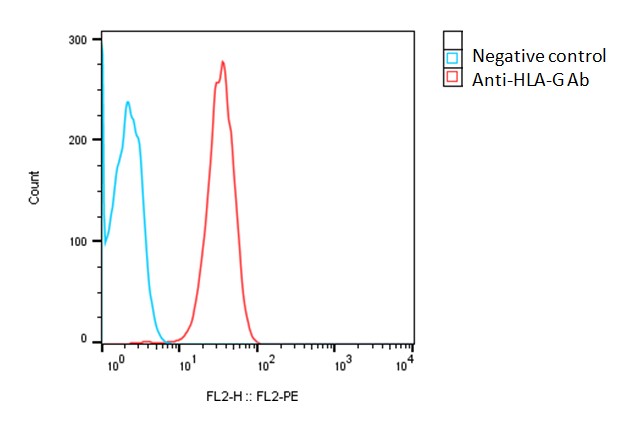
| Catalog Number | Product | Size | Price | |
|---|---|---|---|---|
| C3058 | Human HLA-G-CHO-K1 Stable Cell Line | 2 vials | $4950 | Order |
| Catalog Number | C3058 |
|---|---|
| Cell Line Name | Human HLA-G-CHO-K1 Stable Cell Line |
| Accession Number | NM_001363567.2 |
| Host Cell | Adherent CHO-K1 |
| Quantity | Two vials of frozen cells (2x106 per vial) |
| Culture Medium | DMEM with 10% FBS, 10 µg/ml puromycin |
| Freezing Medium | 90% FBS and 10% DMSO |
| Storage | Liquid nitrogen upon receipt |
| Product Datasheet: | Download PDF |
Detection of human HLA-G expression on human HLA-G-CHO-K1 stable cells using a monoclonal antibody specific for human HLA-G (BioLegend, Cat #335906)

Human leukocyte antigen-G (HLA-G) is a member of the major histocompatibility complex (MHC) class I family. HLA-G exhibits restricted tissue distribution and immune privilege, making it a crucial player in maternal-fetal tolerance, transplantation, and immune evasion in various pathological conditions. HLA-G exerts its immunomodulatory effects through interactions with inhibitory receptors on immune cells, including leukocyte immunoglobulin-like receptor subfamily B (LILRB) and killer cell immunoglobulin-like receptor (KIR) family members. HLA-G engages these receptors and inhibits the activation and cytotoxicity of T cells, natural killer (NK) cells, and antigen-presenting cells (APCs), thus dampening immune responses and promoting tolerance. HLA-G expression is tightly regulated and predominantly observed in immune-privileged sites such as the placenta, cornea, thymus, and pancreatic islets. Aberrant expression of HLA-G has been reported in numerous malignancies, including breast, ovarian, lung, and melanoma cancers and is often associated with immune escape, tumor progression, and poor clinical outcomes. HLA-G expression in cancer is linked to resistance against cytotoxic T lymphocytes (CTLs) and NK cells, facilitating tumor immune evasion. Given its involvement in immune evasion and tumor progression, HLA-G represents an attractive therapeutic target for cancer immunotherapy. Monoclonal antibodies targeting HLA-G or its receptors, as well as immunomodulatory therapies to promote anti-tumor immune responses, hold promise in enhancing the efficacy of cancer treatment.
Carosella, E. D., Rouas-Freiss, N., Roux, D. T., Moreau, P., & LeMaoult, J. HLA-G: An Immune Checkpoint Molecule. Advances in Immunology. 127: 33–144. 2015.
Yan, W. H. HLA-G Expression in Cancers: Roles in Immune Evasion, Metastasis and Target for Therapy. Molecular Medicine. 21(1): 782–791. 2015.
Lin, A., Yan, W. H. HLA-G expression in cancers: roles in immune evasion, metastasis and target for therapy. Molecular Medicine. 21(1): 782-791. 2018.